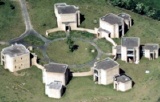EPSRC Symposium Workshop on New directions in computational partial differential equations
New Directions in Computational PDEs
Monday 12 - Friday 16 January 2009
at the
Mathematics Research Centre, University of Warwick, UK
Organisers: John Barrett (Imperial College), Charlie Elliott (Warwick) Chris Schwab (E.T.H.), Endre Süli (Oxford)
PROGRAMME - Abstracts and Talks
Report on Workshop
Background
The analysis of partial differential equations (PDEs) is a fundamental subject area of mathematics which links important strands of pure mathematics to applied and computational mathematics. The practical importance of PDEs cannot be overemphasized. Indeed, PDEs are ubiquitous in almost all applications of mathematics, where they provide a natural mathematical description of phenomena in the physical, natural and social sciences, often arising from fundamental conservation laws. Significant application areas include engineering, materials science, physics, the biological sciences, geophysics and chemistry. In recent years there has been an upsurge of activities on the accurate numerical approximation of coupled multiphysics problems and partial differential equations that exhibit a multiplicity of scales. The coupling of stochastic and deterministic mathematical models has also become an active area of research. A related exciting field is the approximation of high-dimensional partial differential equations; many such PDEs arise as the Fokker-Planck equation for the probability density function of the solution vector to a large system of stochastic ODEs. An emerging field of research is the approximation of differential equations on large geometric graphs and differential equations on networks. Finally, the numerical analysis of geometric evolution equations, PDEs on surfaces and complex domains, and the numerical approximation of degenerate nonlinear evolution equations have also undergone rapid development in the last five years.
Aims
The aim of this workshop is to identify areas of computational PDEs which are important in a range of new and developing application areas, and which require the deveopment of new analytical and computational tools for their succesful resolution.
Format
The conference will start on Monday morning and finish on Friday afternoon. There will be a limited number of lectures per day, to give the participants enough time for discussions and collaborations.
The workshop will be organized around the following topics: (i) Numerical analysis of multiscale and multiphysics problems; (ii) Stochastic numerics and numerics of stochastic PDE’s; (iii) Numerical analysis of high-dimensional PDEs; differential equations on large geometric graphs and lattice differential equations; (iv) Numerical analysis of geometric evolution equations, degenerate equations and PDEs on surfaces and complex domains; (v) Optimal Control and Design in PDEs.
Participants
John W. Barrett (London), Eric Cances (CERMICS, Paris), Klaus Deckelnick (Magdeburg), Qiang Du (Penn State), Charlie Elliott (Warwick), Ivan Graham (Bath), Michael Hinze (Hamburg),Michael Hintermüller (Berlin), Angela Kunoth (Paderborn), Karl Kunisch (Graz), Omar Lakkis(Sussex), John Lowengrub (UC Irvine), Mitch Luskin (Minnesota), Ricardo Nochetto (Maryland), Robert Nürnburg (London), Christoph Ortner (Oxford), Alfio Quarteroni (Lausanne and Milano), Martin Rumpf (Bonn), Carola-Bibiane Schoenlib (Cambridge), Christoph Schwab (ETH Zürich), Bjoern Stinner(Warwick), Andrew Stuart (Warwick), Vanessa Styles (Sussex), Endre Süli (Oxford) Anders Szepessy (Stockholm), Axel Voigt (Dresden), Holger Wendland (Sussex), Enrique Zuazua (Madrid).
On Line Registration is now open
Venue
Greetings will be held in the Common Room of the Mathematics Institute on Monday morning. Talks will be held in the Mathematics Institute. This is building 35 of the Warwick central campus.
Note that the university is located at the outskirts of Coventry and not in Warwick.
See http://www2.warwick.ac.uk/about/visiting/ for travel details and http://www2.warwick.ac.uk/about/visiting/maps/ for maps of the central campus.
In case you come by car, parking is available for delegates at Car Park 15.
This event is part of the 2008–2009 Warwick EPSRC Symposium on Challenges in Scientific Computing
See also:
Mathematics Research Centre
Mathematical Interdisciplinary Research at Warwick (MIR@W)
Past Events
Past Symposia
Where possible, visitors should obtain an EDUROAM account from their own university to enable internet access whilst at Warwick.
You can register for any of the symposia or workshops online. To see which registrations are currently open and to submit a registration, please click hereLink opens in a new window.
Mathematics Research Centre
Zeeman Building
University of Warwick
Coventry CV4 7AL - UK
E-mail:
MRC@warwick.ac.uk

